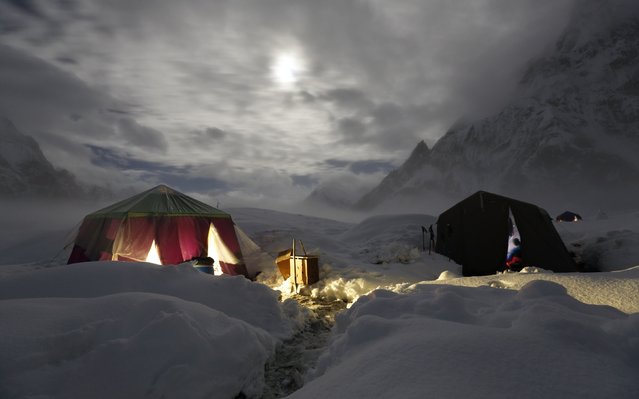
The moon illuminates the snow-covered Concordia, the confluence of the Baltoro and Godwin-Austen glaciers, near the world's second highest mountain the K2 (8,000 meters) in the Karakoram mountain range in Pakistan September 6, 2014. While other parts of Pakistan and northern India were flooded, Concordia in the Karakoram mountain range was covered with a seasonally unusual amount of snow. Geographically, Pakistan is a climbers paradise. It rivals Nepal for the number of peaks over 7,000 meters and is home to the world's second tallest mountain, K2, as well as four of the world's 14 summits higher than 8,000 meters. In more peaceful times, northern Pakistan's unspoilt beauty was a major tourist draw but the potentially lucrative industry has been blighted by years of violence. The number of expeditions has dwindled, wrecking communities dependant on climbing for income and starving Pakistan's suffering economy of much-needed dollars. (Photo by Wolfgang Rattay/Reuters)
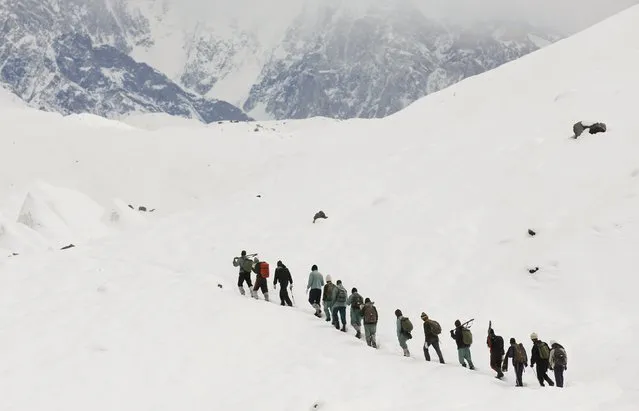
A group of Pakistani soldiers carry their guns uphill along the K2 base camp trek in the Karakoram mountain range in Pakistan September 8, 2014. A local porter receives 700 Pakistani Rupee ($6.8) per day and usually carries 55 pounds. Owners of mules can earn three times as much, as their animals carry 165 pounds. (Photo by Wolfgang Rattay/Reuters)

Porters guide their mules outside the village of Askole in Pakistan August 28, 2014. Geographically, Pakistan is a climbers paradise. It rivals Nepal for the number of peaks over 23,000 feet and is home to the world's second tallest mountain, K2. (Photo by Wolfgang Rattay/Reuters)
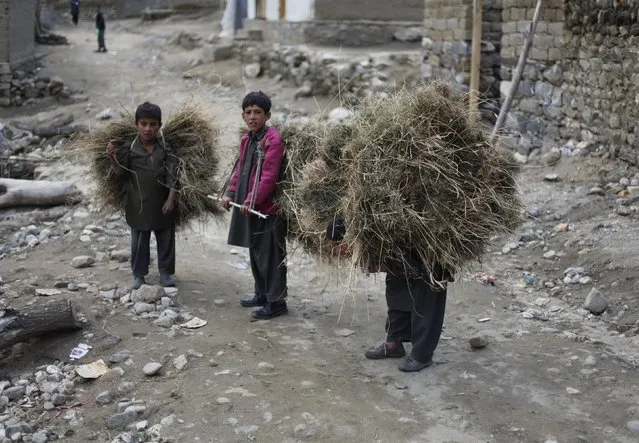
Three boys carry hay in the village of Askole in the Karakoram mountain range in Pakistan September 11, 2014. In more peaceful times, northern Pakistan's unspoilt beauty was a major tourist draw but the potentially lucrative industry has been blighted by years of violence. (Photo by Wolfgang Rattay/Reuters)
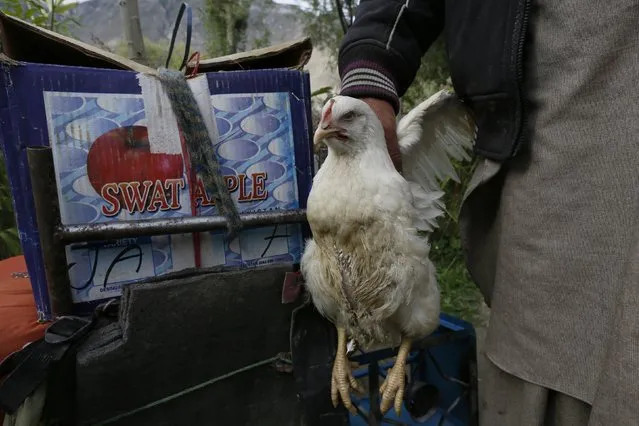
Porter Hassan Gab Khor holds a live chicken before a K2 Base Camp trek in the Karakoram mountain range in northern Pakistan August 28, 2014. (Photo by Wolfgang Rattay/Reuters)
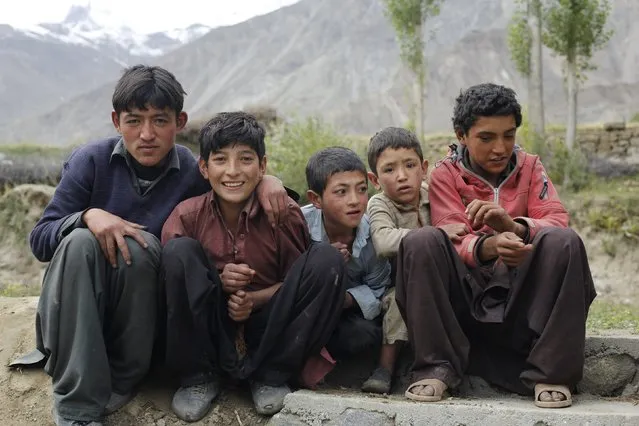
Pakistani boys pose for a picture in the remote mountain village of Askole in the Karakoram mountain range in Pakistan September 11, 2014. The number of expeditions has dwindled, wrecking communities dependant on climbing for income and starving Pakistan's suffering economy of much-needed dollars. (Photo by Wolfgang Rattay/Reuters)

Porters check the weight of a load during a K2 Base Camp trek near the resting point of Paju in the Karakoram mountain range in Pakistan September 10, 2014. (Photo by Wolfgang Rattay/Reuters)

Porter Hassan Trampa, 35, lifts his load in the village of Askole in the Karakoram mountain range in Pakistan August 28, 2014. (Photo by Wolfgang Rattay/Reuters)
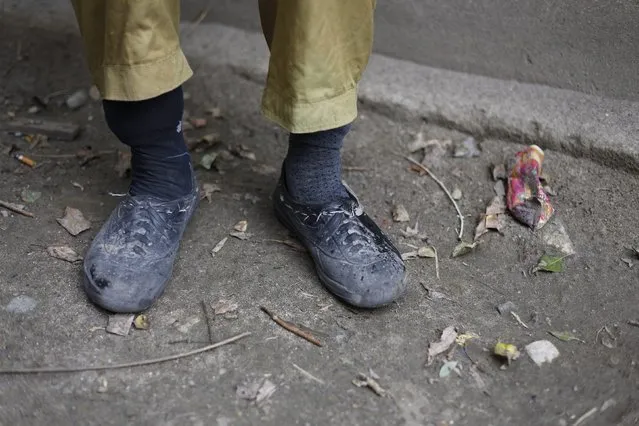
The feet of porter Ibrahim Sino, 33, are pictured following a 16-day K2 base camp trek, in the village of Askole in the Karakoram mountain range in Pakistan September 11, 2014. (Photo by Wolfgang Rattay/Reuters)

A porter carries his load as he walks along a glacial river during a K2 base camp trek, near the resting point of Paju in the Karakoram mountain range in Pakistan September 10, 2014. (Photo by Wolfgang Rattay/Reuters)
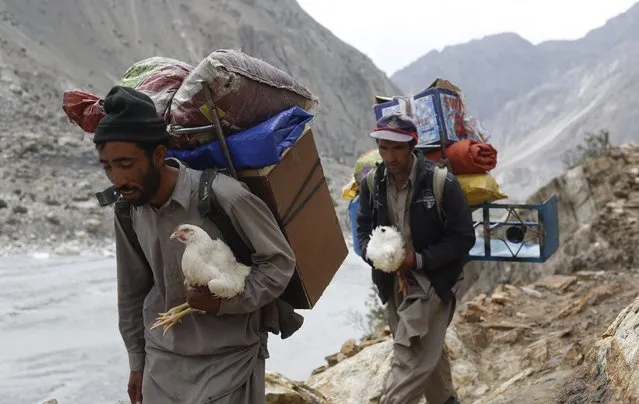
Porters carry live chickens, which serve as meat supplies, during a K2 base camp trek in the Karakoram mountain range in Pakistan August 28, 2014. (Photo by Wolfgang Rattay/Reuters)

A trekking group walks over a rope bridge across the Braldu River in the Karakoram mountain range near the village of Askole in Pakistan August 27, 2014. (Photo by Wolfgang Rattay/Reuters)
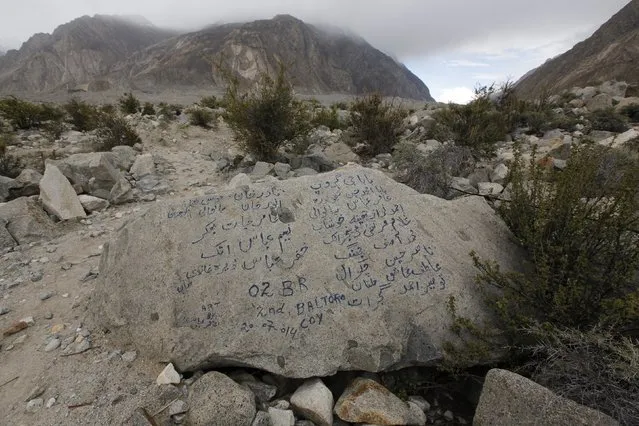
The names of the porters and members of a recent K2 trekking tour are written on a glacial stone along the K2 base camp trek near Korophong in the Karakoram mountain range in Pakistan September 11, 2014. (Photo by Wolfgang Rattay/Reuters)
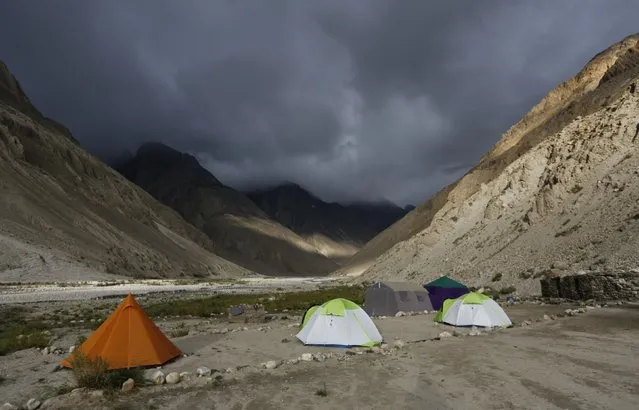
Tents stand under dark rain clouds in the valley of the river Braldu at Bardoumal near the Baltoro glacier in the Karakoram mountain range in Pakistan August 30, 2014. (Photo by Wolfgang Rattay/Reuters)

A cow runs after crossing a rope bridge over the glacial Braldu River near the village of Askole in the Karakoram mountain range in northern Pakistan September 12, 2014. (Photo by Wolfgang Rattay/Reuters)
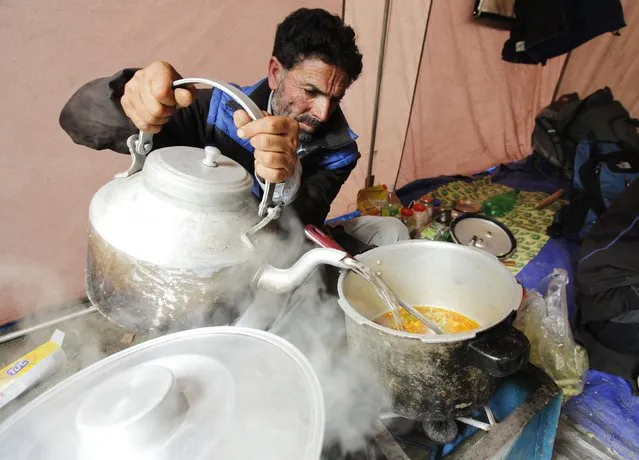
Shukrullah Baig, a 52-year-old brick layer and former cook at a five-star hotel chain cooks Vegetable Masala on his kerosene burner in the village of Askole in the Karakoram mountain range in northern Pakistan September 11, 2014. (Photo by Wolfgang Rattay/Reuters)
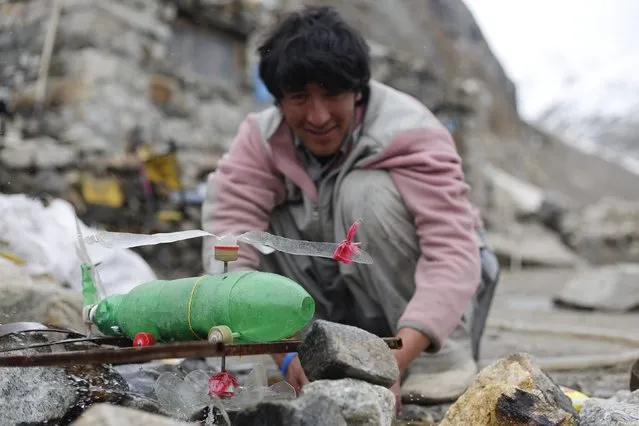
A young porter plays with a helicopter he made from plastic bottles, and which is powered by a water-jet of melting glacial water, at Khoburtse along the K2 base camp trek in the Karakoram mountain range in Pakistan September 9, 2014. (Photo by Wolfgang Rattay/Reuters)
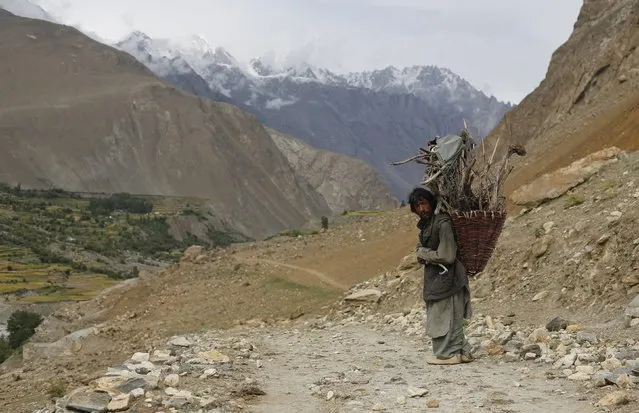
A man from the village of Askole carries firewood in the Karakoram mountain range in Pakistan August 28, 2014. (Photo by Wolfgang Rattay/Reuters)

A trekker stands in the valley of the Braldu River at Bardoumal along the K2 base camp trek in the Karakoram mountain range in Pakistan August 29, 2014. (Photo by Wolfgang Rattay/Reuters)
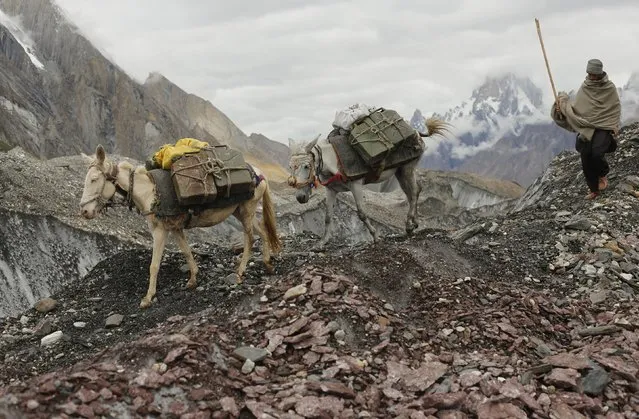
A local farmer drives his mules down the rock-covered Baltoro glacier near Urdokas along the K2 base camp trek in the Karakoram mountain range in Pakistan September 2, 2014. (Photo by Wolfgang Rattay/Reuters)
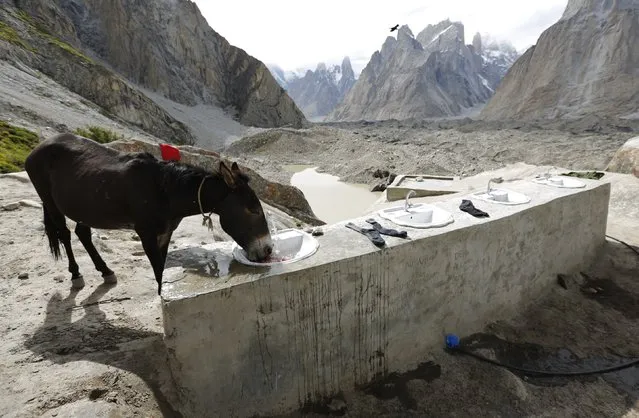
A mule drinks from a basin at a washing place for porters and trekkers at Khoburtse along the K2 base camp trek in the Karakoram mountain range in Pakistan September 1, 2014. A mule can cost between 120,000 and 150,000 Pakistani Rupees (around $1,100 – $1,400) and can earn around $20 per working day for its owner. (Photo by Wolfgang Rattay/Reuters)
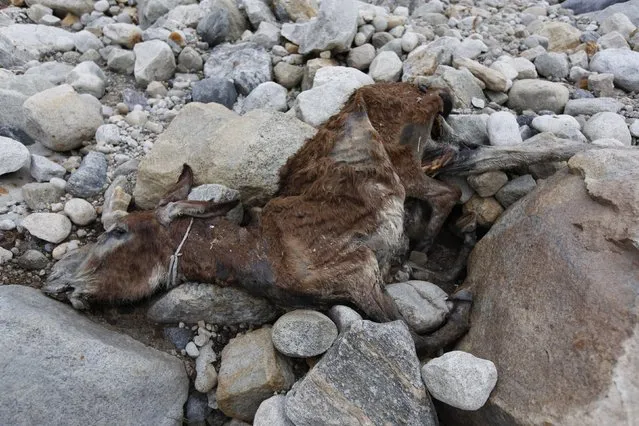
A mule which died during a previous K2 base camp trek lies on the stone-covered Baltoro glacier in the Karakoram mountain range in Pakistan September 9, 2014. (Photo by Wolfgang Rattay/Reuters)

Porters make their way through deep snow on the Baltoro glacier in the Karakoram mountain range in northern Pakistan September 8, 2014. While other parts of Pakistan and northern India were flooded, Concordia in the Karakoram mountain range was covered with a seasonally unusual amount of snow. (Photo by Wolfgang Rattay/Reuters)
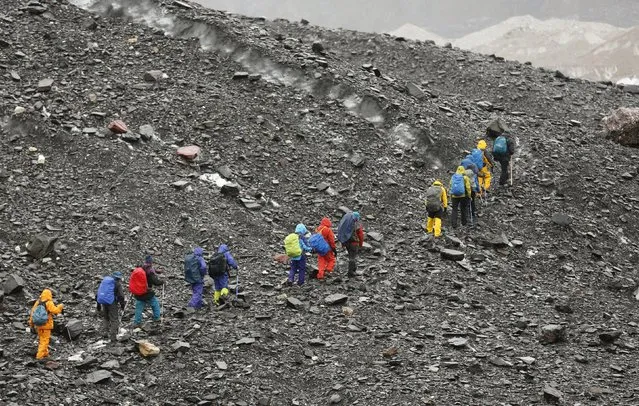
A group of Japanese trekkers climbs the rock-covered Baltoro glacier in the Karakoram mountain range in Pakistan September 3, 2014. (Photo by Wolfgang Rattay/Reuters)
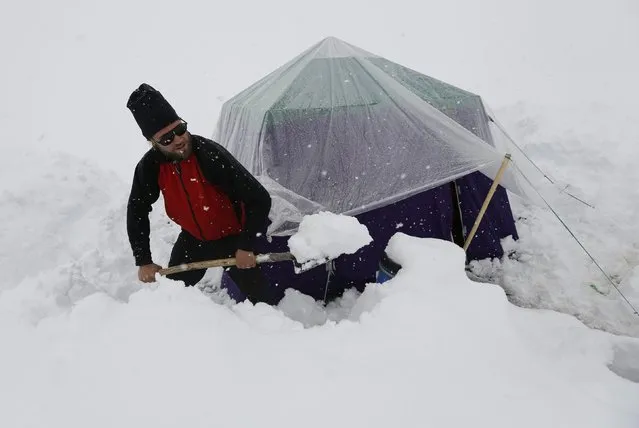
A German trekker removes snow from a kitchen tent at Concordia, the confluence of the Baltoro and Godwin-Austen glaciers, near the world's second highest mountain K2 in the Karakoram mountain range in Pakistan September 5, 2014. (Photo by Wolfgang Rattay/Reuters)
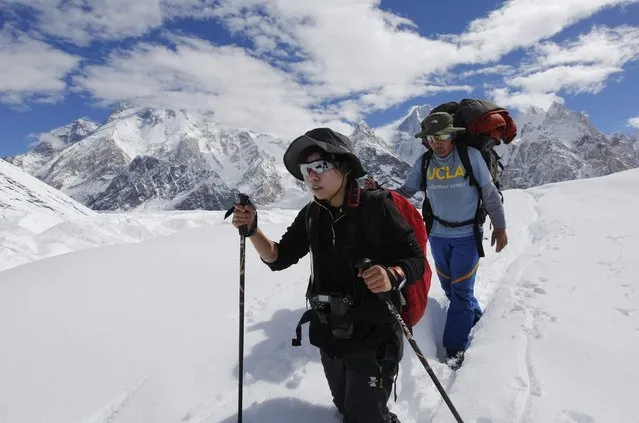
A porter guides his trekking client, 26-year old Yvonne Yip (L), from Hong Kong down the Baltoro glacier in the Karakoram mountain range in Pakistan September 7, 2014. (Photo by Wolfgang Rattay/Reuters)
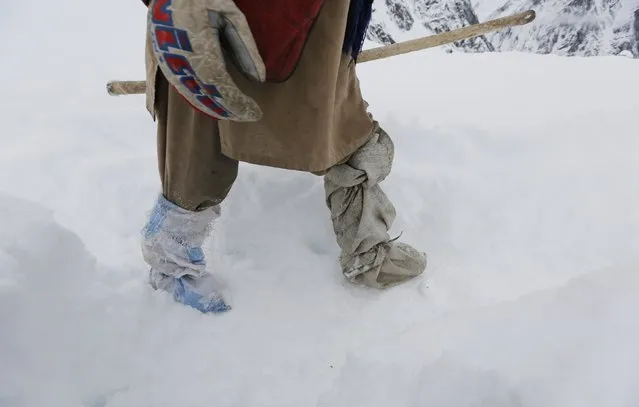
A porter leaves the snow-covered Concordia, the confluence of the Baltoro and Godwin-Austen glaciers, wearing self-made gaiters near K2 in the Karakoram mountain range in Pakistan September 6, 2014. (Photo by Wolfgang Rattay/Reuters)
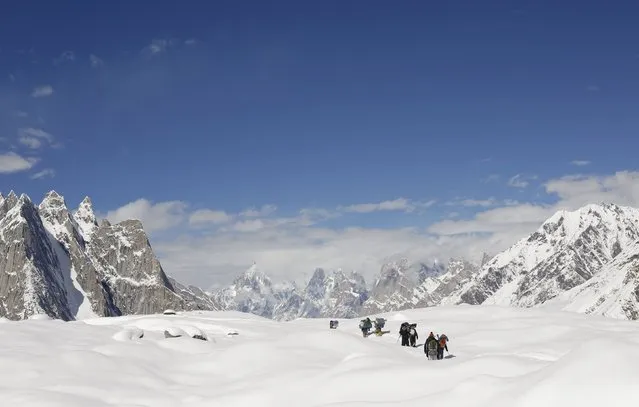
Trekkers and porters hike down the Baltoro glacier in the Karakoram mountain range in Pakistan September 7, 2014. (Photo by Wolfgang Rattay/Reuters)
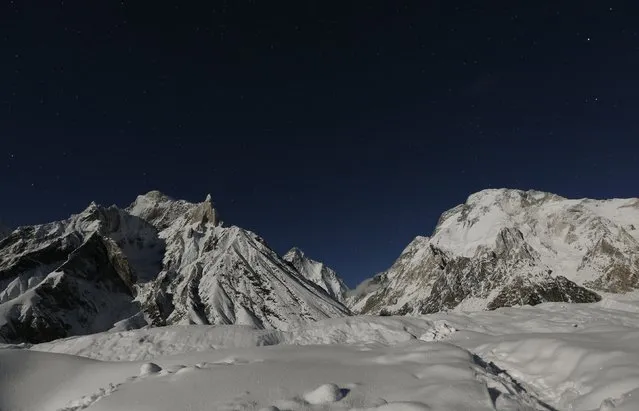
The world's second largest mountain, K2 (seen in the distance), and Broad Peak (R), are illuminated by the moon at Concordia, the confluence of the Baltoro and Godwin-Austen glaciers, in the Karakoram mountain range in Pakistan September 7, 2014. (Photo by Wolfgang Rattay/Reuters)
24 Oct 2014 12:27:00,
post received
0 comments
